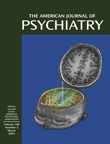Quetiapine and Falsely Elevated Nortriptyline Level
To the Editor: Drug interference in laboratory assays is becoming more complicated as newer drugs are introduced. This is the first report, to our knowledge, of the atypical antipsychotic quetiapine causing falsely elevated serum levels of nortriptyline by standard immunoassay.
Ms. A was a 42-year-old woman with diagnoses of schizoaffective disorder and borderline personality disorder. She was hospitalized for acute exacerbation of schizoaffective disorder with psychosis, depression, and suicidal ideation. Quetiapine was added to her medication regimen (nortriptyline, 25 mg q.i.d.; levothyroxine, 0.1 mg/day; and lithium, 300 mg t.i.d.) and titrated up to 200 mg t.i.d. over several weeks.
Her serum nortriptyline level, measured at admission, was noted to be 34 ng/ml. Several weeks later, a repeat serum level was noted to be 487 ng/ml. Ms. A, however, exhibited no signs of acute toxicity. Discussion with the reference laboratory revealed that the supratherapeutic level had been ascertained by using standard immunoassay. Repeat analysis of her blood with high-performance liquid chromatography demonstrated a blood level of nortriptyline of 216 ng/ml. Although high, this level was more consistent with her drug dose and clinical picture.
Ms. A’s original serum drug level was assessed by using the Tricyclic Antidepressants Assay (Abbott Laboratories, Abbott Park, Ill.), a fluorescence polarization immunoassay run on the TDx/TDxFlx analyzer (Abbott Laboratories). Based on the competitive binding principle, this assay uses antibodies that detect a wide variety of tricyclic compounds in serum and plasma. Quetiapine, structurally similar to the tricyclic antidepressants, has been noted to interfere with immunoassays for tricyclic antidepressants (1, 2). Repeat analysis of Ms. A’s serum by using high-performance liquid chromatography demonstrated the presence of quetiapine and its metabolites. These were identified and differentiated from Ms. A’s serum levels of nortriptyline and nortriptyline metabolites.
In summary, quetiapine can interfere with standard immunoassays for tricyclic compounds and indicate falsely elevated levels. It is advisable to alert the laboratories of patients taking quetiapine when serum tricyclic assays are performed. In these circumstances, high-performance liquid chromatography, rather than an immunoassay, is the test of choice.
1. Sloan KL, Haver VM, Saxon AJ: Quetiapine and false-positive urine drug testing for tricyclic antidepressants (letter). Am J Psychiatry 2000; 157:148-149Link, Google Scholar
2. Al-Mateen CS, Wolf CE II: Falsely elevated imipramine levels in a patient taking quetiapine (letter). J Am Acad Child Adolesc Psychiatry 2002; 41:5-6Crossref, Medline, Google Scholar



